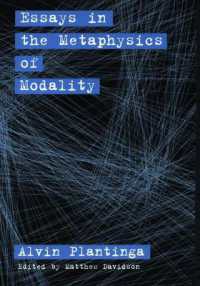- ホーム
- > 洋書
- > 英文書
- > Philosophy
基本説明
This second, revised edition contains a new preface, a substantive postscript to Chapter 1 about "the subject of moral philosophy"; the addition of a new chapter on the importance of emotion in practices of responsibility; and the addition of an afterword, which responds to critics of the book.
Full Description
This is a revised edition of Walker's well-known book in feminist ethics first published in 1997. Walker's book proposes a view of morality and an approach to ethical theory which uses the critical insights of feminism and race theory to rethink the epistemological and moral position of the ethical theorist, and how moral theory is inescapably shaped by culture and history. The main gist of her book is that morality is embodied in "practices of responsibility" that express our identities, values, and connections to others in socially patterned ways. Thus ethical theory needs to be empirically informed and politically critical to avoid reiterating forms of socially entrenched bias. Responsible ethical theory should reveal and question the moral significance of social differences. The book engages with, and challenges, the work of contemporary analytic philosophers in ethics.
This is a revised edition of Walker's well-known book in feminist ethics first published in 1997. Walker's book proposes a view of morality and an approach to ethical theory which uses the critical insights of feminism and race theory to rethink the epistemological and moral position of the ethical theorist, and how moral theory is inescapably shaped by culture and history. The main gist of her book is that morality is embodied in "practices of responsibility" that express our identities, values, and connections to others in socially patterned ways. Thus ethical theory needs to be empirically informed and politically critical to avoid reiterating forms of socially entrenched bias. Responsible ethical theory should reveal and question the moral significance of social differences. The book engages with, and challenges, the work of contemporary analytic philosophers in ethics.
Contents
PREFACE TO THE SECOND EDITION ; PREFACE THE FIRST EDITION ; PART ONE. THE MIS-EN-SCENE: MORAL PHILOSOPHY NOW ; 1. The Subject of Moral Philosophy, with Postscript, 2007 ; 2. Where Do Moral Theories Come From? Henry Sidgwick and Twentieth Century Ethics ; PART TWO. CLEARER VIEWS: AN EXPRESSIVE-COLLABORATIVE MODEL ; 3. Authority and Transparency; The Examples of Feminist Skepticism ; 4. Charting Responsibilities: From Established Coordinates to Terra Incognita ; PART THREE. SELF- (AND OTHER) PORTRAITS: WHO ARE WE, AND HOW DO WE KNOW? ; 5. Picking Up Pieces: Lives, Stories and Integrity ; 6. Career Selves: Plans, Projects, and Plots in "Whole Life ethics" ; 7. Made A Slave, Born a Woman: Knowing Others' Places ; 8. Unnecessary Identities: Representational Practices and Moral Recognition ; PART FOUR: TESTING SIGHT LINES ; 9. The Politics of Transparency and the Moral Work of Truth ; 10. Peripheral Visions, Critical Practice ; EPILOGUE: SOME QUESTIONS ABOUT MORAL UNDERSTANDINGS ; NOTES ; BIBLIOGRAPHY







